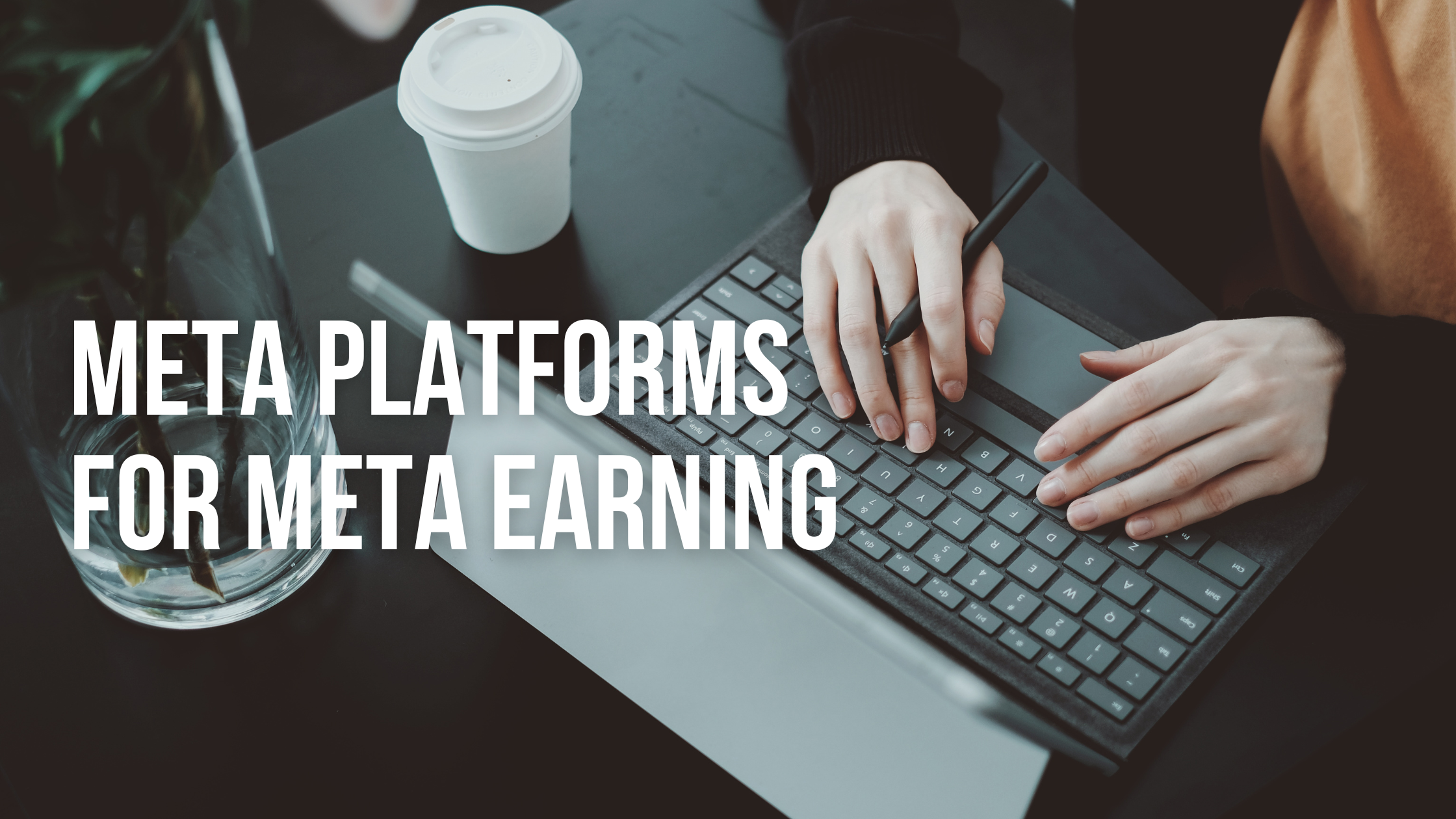Introduction:
When you hear the term “Meta Earning,” you may wonder if it refers to earning money in the metaverse. Or simply the financial performance of Meta (the company)? And it’s reasonable. The word has become a bit… hazy. One thing is certain, though, whether you’re examining Meta’s stock, making money off of virtual experiences, or simply attempting to predict the direction of the entire digital economy: despite the fact that the landscape seems to be still being mapped out, the opportunities are genuine.
Let’s dissect it, then. Not in the pretentious, business-speak manner, but rather as though you’re speaking with someone who has actually attempted to navigate this area (and perhaps made a few mistakes along the way).
1. Meta’s Ad Ecosystem (Still the Heavy Hitter for Meta Earning)
Whether you like it or not, the majority of Meta’s revenue comes from advertising. Although Facebook and Instagram advertisements are not new, the targeting is constantly changing. If done correctly, AI-driven placements and more immersive ad formats (think interactive video or augmented reality try-ons) can result in absurdly high engagement rates.
However, privacy changes have made things more difficult (Apple’s App Tracking Transparency, for example). The same old tactics are no longer sufficient. Here’s the thing, though: Workarounds such as AI-powered predictions and first-party data integration are still being discovered by Meta (For Meta Earning). It’s evolving, but it’s not flawless.
2. Virtual Goods and the Creator Economy (Where Things Get Interesting)
Selling digital outfits for avatars might sound niche, but people are spending on this stuff. Horizon Worlds, Meta’s VR platform, is slowly building a marketplace where creators can sell virtual items—clothing, accessories, even virtual real estate. The market’s still young, sure, but early adopters are carving out revenue streams.
And then there’s Meta’s take on the creator economy. Instagram Reels bonuses, Facebook Stars, and subscription models let creators monetize directly. It’s not quite YouTube-level yet, but the infrastructure is there.
Read more: The Ultimate Guide to Freelancing Success in 2025
3. Meta’s AI Bet (Beyond Chatbots)
Although it may seem specialized, selling digital clothing for avatars is something that people are willing to pay for. Meta’s virtual reality platform, Horizon Worlds, is gradually creating a marketplace where creators can sell virtual goods like apparel, accessories, and even real estate. Although the market is still in its infancy, early adopters are generating income.
Meta’s perspective on the creator economy comes next. Creators can make money directly through Facebook Stars, Instagram Reels bonuses, and subscription models. The infrastructure is in place, but it’s not quite YouTube-level yet.

4. The Metaverse Play (Long Game, But Not Dead)
People are willing to pay for digital clothing for avatars, despite the fact that it may seem specialized. Horizon Worlds, Meta’s virtual reality platform, is progressively developing a marketplace where producers can offer virtual goods such as clothing, accessories, and even real estate. Early adopters are making money even though the market is still young.
Next is Meta’s take on the creator economy for Meta Earning. Facebook Stars, Instagram Reels bonuses, and subscription models are direct revenue streams for creators. Although the infrastructure is there, it isn’t yet on par with YouTube.
Read more: Meta Investor Relations
5. E-Commerce and Shops (Because Social Selling Isn’t Going Away)
People are willing to pay for digital clothing for avatars, despite the fact that it may appear specialized. Manufacturers can now sell virtual goods like clothing, accessories, and even real estate through Horizon Worlds, Meta’s virtual reality platform. Early adopters are making money even though the market is still young.
Next is Meta’s take on the creator economy. Facebook Stars, Instagram Reels bonuses, and subscription models are examples of direct revenue streams for creators. Although the infrastructure is there, it isn’t as good as YouTube just yet.
6. Meta’s Stock (The Traditional Angle)
Investing in Meta’s stock is an alternative if you’re not convinced by the “digital economy” concept. Their earnings reports continue to influence markets, particularly given the impact of investments in AI and the metaverse on profitability for Meta Earning. Changeable? Yes. But it’s worth watching if you’re betting on Zuckerberg’s long-term goals (or just short-term ad rebounds).
Final Thoughts (Because Clarity Is Overrated)
The problem with “meta earnings” is that they’re messy. Though not all of the opportunities are fully developed, they do exist. Some will fade away for Meta Earning. When we least expect it, others may blow up.
Start small if you’re jumping in headfirst. Consider testing an AI-driven marketing campaign. If there is a market for virtual goods, try them out. Or simply watch Meta’s stock and bide your time until the next significant event.
Read more: Meta Reports First Quarter 2025 Results
Key Questions About Meta Earnings
1. Can small businesses still profit from Meta ads in 2025?
Yes, but it’s harder. With rising ad costs, success now depends on highly engaging content (Reels, interactive ads) and retargeting strategies. If you’re still relying only on static image ads, you’ll struggle.
2. Is the metaverse already dead for earnings?
No, but it’s niche. Big brands (Nike, Gucci) are experimenting with virtual stores and NFT wearables. Meanwhile, VR developers and virtual event hosts are making money just not at “get rich quick” levels.
3. How much can creators realistically earn on Meta platforms for Meta Earning?
-
Top-tier influencers: $10K–$100K/month (brand deals + bonuses).
-
Mid-level creators: $1K–$10K/month (Reels bonuses + Stars).
-
Small creators: $100–$1K/month (harder without viral hits).
4. Will AI replace jobs in Meta’s ecosystem for Meta Earning?
Some, yes. AI is automating ad buying, customer service, and content creation. But it’s also creating new jobs in AI management, VR development, and data analysis.
5. Is Meta stock a good long-term investment?
If you believe in AI & the metaverse, yes. But short-term, expect turbulence. Regulatory risks and metaverse losses could keep the stock volatile.

